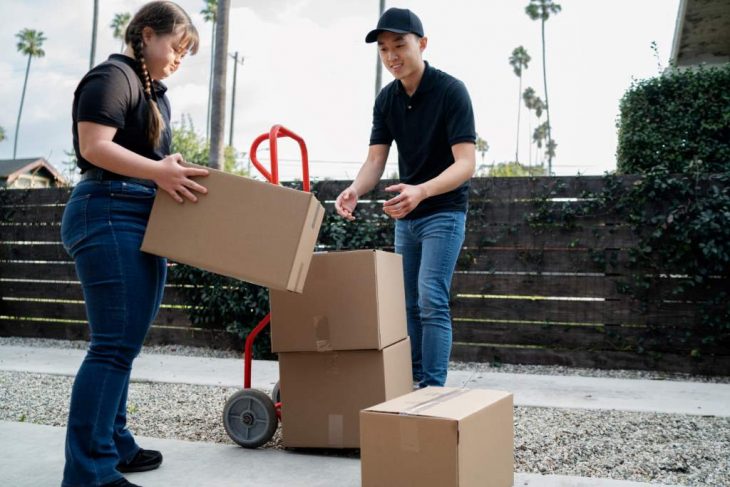
In the dynamic landscape of modern business, coworking spaces have become a popular choice for entrepreneurs and startups seeking flexible and collaborative work environments.
One innovative trend within this realm is the emergence of coworking kitchen spaces. These communal kitchens provide a shared and well-equipped culinary haven for food-based businesses, culinary enthusiasts, and aspiring chefs.
The success of such spaces hinges on a seamless setup, and one key player in achieving this is the moving company.
In this blog post, we’ll explore the pivotal role of moving companies in transforming trucks into the foundation of vibrant coworking kitchen spaces.

The Rise of Coworking Kitchen Spaces
Coworking kitchen spaces are a response to the growing demand for affordable, collaborative, and fully equipped culinary environments.
They offer a unique solution for food entrepreneurs who may not have the resources to establish their own commercial kitchens.
From food startups and catering businesses to individual chefs and bakers, these spaces cater to a diverse range of culinary professionals.
The Seamless Setup: A Collaborative Effort
Creating a functional co-working kitchen space involves a collaborative effort from various professionals, and moving companies play a crucial role in ensuring a seamless transition from concept to reality.
Transportation of Equipment and Supplies
Moving companies excel in the transportation of heavy and delicate equipment. In the context of coworking kitchens, this means safely moving industrial-grade stoves, ovens, refrigerators, and other essential appliances from suppliers to the designated space.
This process requires precision and expertise to ensure that the equipment arrives in pristine condition, ready for use.
Space Optimization
Efficient use of space is vital in coworking kitchens, where multiple businesses or individuals share the same facilities.
Moving companies, with their experience in spatial organization, play a key role in arranging and optimizing the layout of the kitchen.
This includes strategic placement of workstations, storage units, and equipment to maximize functionality and ease of use.
Installation and Setup
Once the equipment and supplies are on-site, moving companies are responsible for the meticulous installation and setup of each component.
This involves more than just placing appliances; it requires a keen understanding of the kitchen workflow to ensure that everything is connected and operational.
From gas lines to electrical connections, moving companies coordinate with other professionals to guarantee a fully functional kitchen space.
Logistical Coordination
Coworking kitchen setups often involve coordination with various vendors, suppliers, and professionals.
Moving companies act as logistical coordinators, ensuring that deliveries align with the project timeline and that all components come together seamlessly.
This level of coordination is essential to prevent delays and keep the project on track.
Challenges and Solutions
Despite the seamless setup, challenges may arise during the transformation of a truck into a coworking kitchen space. Some common challenges and their solutions include:
Regulatory Compliance
Compliance with health and safety regulations is paramount in commercial kitchens.
Moving companies, working in conjunction with regulatory experts, ensure that the setup meets all necessary standards, including ventilation, sanitation, and accessibility.
Customization for Diverse Needs
Different culinary professionals have diverse requirements. Moving companies collaborate with designers and stakeholders to ensure that the coworking kitchen is customizable, catering to the specific needs of various businesses or individuals sharing the space.
Cost Management
Managing costs is a critical aspect of any business endeavor. Moving companies work closely with clients to develop cost-effective transportation and setup plans, ensuring that the project stays within budget without compromising on quality.
Sustainability in Motion
As the world embraces sustainable practices, the role of moving companies extends beyond logistics to include a commitment to environmentally friendly processes.
This subheading delves into how moving companies contribute to the eco-conscious design and implementation of coworking kitchens.
From using fuel-efficient vehicles to recycling packaging materials, these companies play a pivotal role in ensuring that the setup aligns with the broader goals of sustainability, making coworking kitchens not just functional but also environmentally responsible.
Technology Integration
In the digital age, technology is an integral part of every industry, including culinary ventures. This section explores how moving companies collaborate with tech experts to seamlessly integrate digital tools and smart solutions into coworking kitchen spaces.
From state-of-the-art kitchen management software to IoT-enabled appliances, the synergy between moving companies and technology specialists ensures that these shared culinary spaces are not only well-equipped but also technologically advanced, providing a cutting-edge environment for culinary professionals to thrive.
Conclusion
In the rapidly evolving landscape of coworking spaces, the integration of coworking kitchen spaces represents an exciting intersection of innovation and practicality.
The seamless setup of these spaces, from truck to table, requires the expertise of moving companies. Their ability to transport, organize, and install equipment ensures that these culinary hubs are not only functional but also conducive to collaboration and creativity.








